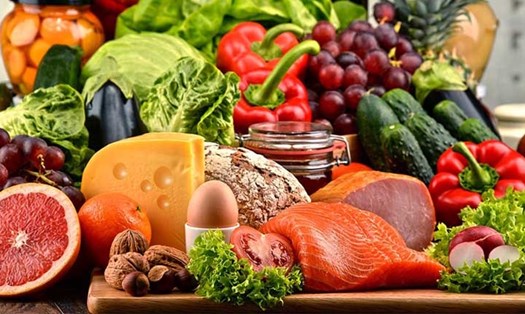Seafood (shrimp, crab, salmon, sardines)
Purines are natural compounds found in the cells of all living things. When the body breaks down purines, it produces uric acid.
According to research from the Arthritis Foundation, seafood such as sardines, salmon, mackerel, and shrimp are very high in purines (150-400 mg purines/100 g of food). When these foods are consumed, the body produces more uric acid, leading to increased uric acid levels in the blood.
At the same time, the liver is the main organ that processes purines to convert them into uric acid. When consuming large amounts of seafood high in purines, the liver has to work overtime to metabolize them. This increases the rate of uric acid production, making it difficult for the body to control the concentration.
Red meat (beef, pork, lamb) and animal organs
Red meat and animal organs contain large amounts of purines, a natural compound that when broken down produces uric acid.
According to the Gout Education Society, animal organs, especially liver and kidneys, are among the foods with the highest purine content (about 300-800 mg purine/100 g). When consuming these foods, the body will produce large amounts of uric acid.
At the same time, red meat and animal organs often contain high amounts of saturated fat. This fat can cause inflammation and affect kidney function, reducing the body's ability to remove uric acid, thereby increasing the risk of uric acid accumulation.
Alcoholic beverages (beer, wine)
Alcohol reduces the effectiveness of the kidneys in removing uric acid through urine. Instead of prioritizing uric acid excretion, the body focuses on processing and eliminating alcohol, leading to a buildup of uric acid in the blood.
Alcohol has a diuretic effect, causing the body to lose more water through urine. This dehydration thickens the blood, causing higher uric acid levels. This also reduces the ability of the kidneys to excrete uric acid.
Foods rich in fructose (sweets, soft drinks)
Fructose is a simple sugar that, when metabolized in the body, produces adenosine triphosphate (ATP). This process increases the amount of free purines, leading to increased production of uric acid in the blood.
According to a study published in The American Journal of Clinical Nutrition, fructose is the only sugar directly linked to stimulating the body to produce uric acid.
Fructose consumption increases uric acid levels in the blood, while also reducing the kidneys' ability to remove uric acid through urine. This leads to a buildup of uric acid, increasing the risk of gout or kidney stones.
Important Note:
Limit the above foods: Especially if you have been diagnosed with high uric acid or have a history of gout.
Prioritize a healthy diet: Increase foods low in purines (green vegetables, grains, eggs) and drink plenty of water to help excrete uric acid through the kidneys.
Proper dietary control plays an important role in maintaining stable uric acid levels and preventing related complications.


